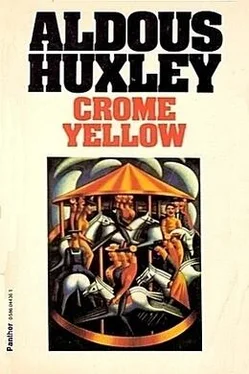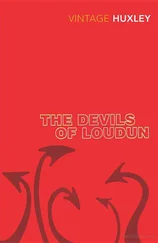Mr. Barbecue–Smith was gone. The motor had whirled him away to the station; a faint smell of burning oil commemorated his recent departure. A considerable detachment had come into the courtyard to speed him on his way; and now they were walking back, round the side of the house, towards the terrace and the garden. They walked in silence; nobody had yet ventured to comment on the departed guest.
"Well?" said Anne at last, turning with raised inquiring eyebrows to Denis.
"Well?" It was time for someone to begin.
Denis declined the invitation; he passed it on to Mr Scogan. "Well?" he said.
Mr. Scogan did not respond; he only repeated the question, "Well?"
It was left for Henry Wimbush to make a pronouncement. "A very agreeable adjunct to the week–end," he said. His tone was obituary.
They had descended, without paying much attention where they were going, the steep yew–walk that went down, under the flank of the terrace, to the pool. The house towered above them, immensely tall, with the whole height of the built–up terrace added to its own seventy feet of brick facade. The perpendicular lines of the three towers soared up, uninterrupted, enhancing the impression of height until it became overwhelming. They paused at the edge of the pool to look back.
"The man who built this house knew his business," said Denis. "He was an architect."
"Was he?" said Henry Wimbush reflectively. "I doubt it. The builder of this house was Sir Ferdinando Lapith, who flourished during the reign of Elizabeth. He inherited the estate from his father, to whom it had been granted at the time of the dissolution of the monasteries; for Crome was originally a cloister of monks and this swimming–pool their fish–pond. Sir Ferdinando was not content merely to adapt the old monastic buildings to his own purposes; but using them as a stone quarry for his barns and byres and outhouses, he built for himself a grand new house of brick—the house you see now."
He waved his hand in the direction of the house and was silent, severe, imposing, almost menacing, Crome loomed down on them.
"The great thing about Crome," said Mr. Scogan, seizing the opportunity to speak, "is the fact that it's so unmistakably and aggressively a work of art. It makes no compromise with nature, but affronts it and rebels against it. It has no likeness to Shelley's tower, in the 'Epipsychidion,' which, if I remember rightly—
"'Seems not now a work of human art, But as it were titanic, in the heart Of earth having assumed its form and grown Out of the mountain, from the living stone, Lifting itself in caverns light and high.'
"No, no, there isn't any nonsense of that sort about Crome. That the hovels of the peasantry should look as though they had grown out of the earth, to which their inmates are attached, is right, no doubt, and suitable. But the house of an intelligent, civilised, and sophisticated man should never seem to have sprouted from the clods. It should rather be an expression of his grand unnatural remoteness from the cloddish life. Since the days of William Morris that's a fact which we in England have been unable to comprehend. Civilised and sophisticated men have solemnly played at being peasants. Hence quaintness, arts and crafts, cottage architecture, and all the rest of it. In the suburbs of our cities you may see, reduplicated in endless rows, studiedly quaint imitations and adaptations of the village hovel. Poverty, ignorance, and a limited range of materials produced the hovel, which possesses undoubtedly, in suitable surroundings, its own 'as it were titanic' charm. We now employ our wealth, our technical knowledge, our rich variety of materials for the purpose of building millions of imitation hovels in totally unsuitable surroundings. Could imbecility go further?"
Henry Wimbush took up the thread of his interrupted discourse. "All that you say, my dear Scogan," he began, "is certainly very just, very true. But whether Sir Ferdinando shared your views about architecture or if, indeed, he had any views about architecture at all, I very much doubt. In building this house, Sir Ferdinando was, as a matter of fact, preoccupied by only one thought—the proper placing of his privies. Sanitation was the one great interest of his life. In 1573 he even published, on this subject, a little book—now extremely scarce—called, 'Certaine Priuy Counsels' by 'One of Her Maiestie's Most Honourable Priuy Counsels, F.L. Knight', in which the whole matter is treated with great learning and elegance. His guiding principle in arranging the sanitation of a house was to secure that the greatest possible distance should separate the privy from the sewage arrangements. Hence it followed inevitably that the privies were to be placed at the top of the house, being connected by vertical shafts with pits or channels in the ground. It must not be thought that Sir Ferdinando was moved only by material and merely sanitary considerations; for the placing of his privies in an exalted position he had also certain excellent spiritual reasons. For, he argues in the third chapter of his 'Priuy Counsels', the necessities of nature are so base and brutish that in obeying them we are apt to forget that we are the noblest creatures of the universe. To counteract these degrading effects he advised that the privy should be in every house the room nearest to heaven, that it should be well provided with windows commanding an extensive and noble prospect, and that the walls of the chamber should be lined with bookshelves containing all the ripest products of human wisdom, such as the Proverbs of Solomon, Boethius's 'Consolations of Philosophy', the apophthegms of Epictetus and Marcus Aurelius, the 'Enchiridion' of Erasmus, and all other works, ancient or modern, which testify to the nobility of the human soul. In Crome he was able to put his theories into practice. At the top of each of the three projecting towers he placed a privy. From these a shaft went down the whole height of the house, that is to say, more than seventy feet, through the cellars, and into a series of conduits provided with flowing water tunnelled in the ground on a level with the base of the raised terrace. These conduits emptied themselves into the stream several hundred yards below the fish–pond. The total depth of the shafts from the top of the towers to their subterranean conduits was a hundred and two feet. The eighteenth century, with its passion for modernisation, swept away these monuments of sanitary ingenuity. Were it not for tradition and the explicit account of them left by Sir Ferdinando, we should be unaware that these noble privies had ever existed. We should even suppose that Sir Ferdinando built his house after this strange and splendid model for merely aesthetic reasons."
The contemplation of the glories of the past always evoked in Henry Wimbush a certain enthusiasm. Under the grey bowler his face worked and glowed as he spoke. The thought of these vanished privies moved him profoundly. He ceased to speak; the light gradually died out of his face, and it became once more the replica of the grave, polite hat which shaded it. There was a long silence; the same gently melancholy thoughts seemed to possess the mind of each of them. Permanence, transience—Sir Ferdinando and his privies were gone, Crome still stood. How brightly the sun shone and how inevitable was death! The ways of God were strange; the ways of man were stranger still…
"It does one's heart good," exclaimed Mr. Scogan at last, "to hear of these fantastic English aristocrats. To have a theory about privies and to build an immense and splendid house in order to put it into practise—it's magnificent, beautiful! I like to think of them all: the eccentric milords rolling across Europe in ponderous carriages, bound on extraordinary errands. One is going to Venice to buy La Bianchi's larynx; he won't get it till she's dead, of course, but no matter; he's prepared to wait; he has a collection, pickled in glass bottles, of the throats of famous opera singers. And the instruments of renowned virtuosi—he goes in for them too; he will try to bribe Paganini to part with his little Guarnerio, but he has small hope of success. Paganini won't sell his fiddle; but perhaps he might sacrifice one of his guitars. Others are bound on crusades—one to die miserably among the savage Greeks, another, in his white top hat, to lead Italians against their oppressors. Others have no business at all; they are just giving their oddity a continental airing. At home they cultivate themselves at leisure and with greater elaboration. Beckford builds towers, Portland digs holes in the ground, Cavendish, the millionaire, lives in a stable, eats nothing but mutton, and amuses himself—oh, solely for his private delectation—by anticipating the electrical discoveries of half a century. Glorious eccentrics! Every age is enlivened by their presence. Some day, my dear Denis," said Mr Scogan, turning a beady bright regard in his direction—"some day you must become their biographer—'The Lives of Queer Men.' What a subject! I should like to undertake it myself."
Читать дальше











